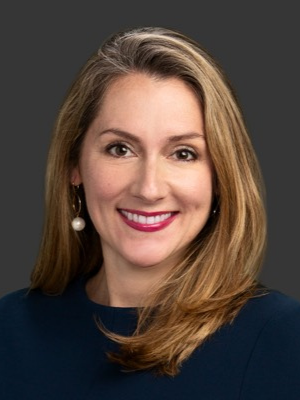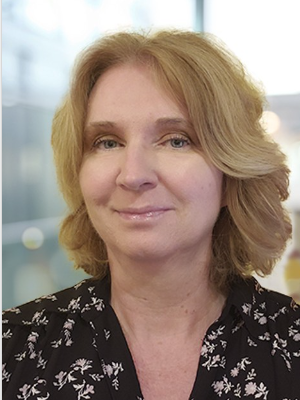 “Sometimes you don’t even see your own potential,” says Sabina Munnelly. “But when someone makes it clear that they see something in you, their belief in you can help grow a belief in yourself that you might have not even had.”
“Sometimes you don’t even see your own potential,” says Sabina Munnelly. “But when someone makes it clear that they see something in you, their belief in you can help grow a belief in yourself that you might have not even had.”
Munnelly speaks to openness on your path, being a force of nature, surpassing the barriers and the value of mirrors that reflect and magnify your possibilities.
Embracing Opportunity and Switching It Up
Since the moment that computers were introduced in the ‘90s halfway through her education at Trinity College in Dublin, Munnelly began a career she would never have seen coming.
“Embrace what comes at you. You don’t have to control everything, and it doesn’t always have to fit in with what you originally thought,” says Munnelly. “I got a whole other opportunity because I opened my mind to the technology piece.”
After starting in banking as a technology tester, Munnelly worked for Compaq and Hewlett Packard, gaining vast experience with big players. Rather than transition to management, she joined Accenture so she could continue to keep her hands in project work. Across 16 years, she jumped between various tech and data related areas of expertise, becoming a Managing Director at Accenture Applied Intelligence, and moving to New York from Europe.
“I always like to pivot every three years or so, to keep myself up to date. I’m a bit of a magpie,” confesses Munnelly. “Anything that is white space. Give me a white board, and I’ll figure it out. I prefer that, so my journey has been a constant evolution.”
In 2021, she joined Baringa, a global management consultancy working across multiple sectors including energy, financial services, telecoms, media, consumer goods, retail and government. As a leading advisor on the energy transition globally, sustainability runs through much of the business’s work across sectors. In addition to enjoying the entrepreneurial spirit of building a fast-growing team in the U.S., Munnelly feels she’s come full circle to interests at her roots, having written her thesis on wind farming back in college.
“From a financial services perspective, there’s a lot of momentum behind the notion that if you can put the capital to make the most impact in the right place, then change happens where the money goes,” notes Munnelly. “If I can be involved in making change happen through climate activity and how investors deploy their capital to fund those changes, that really resonates with me.”
Equally, culture was a big factor in her move: “For me, you have to be able to get up in the morning and love what you do and love the people your work with. A people-focused business was really important to me.”
A Force of Nature
Describing herself as driven, Munnelly feels curiosity and a love of learning and problem solving motivate her. She enjoys start-to-finish involvement, and smiles saying she would be called “a force of nature” by her colleagues.
“It’s definitely an energy, but also a cohesion with the team.”
While she’ll come into a room with a strong point of view, she feels ‘nature’ implies a melding with the environment. She’s very much about being ‘in it together’ as a team and enjoying the adventure, and feels energized by working with others. These days, she would admit that her intuition and her attunement to reading the energy of a room have been important contributions to her success, as well as self-care.
Her sensitivity to her own and other’s energy has increasingly been a validated part of how she navigates her work-life: “I balance my energy. So I don’t think about the hours I work. I actually think about the energy I expend in a day.”
If You Can See It…
Growing up with three younger brothers, Munnelly was both accustomed to being in male-dominated spaces and being respected in them. So when she went into finance and tech, her context didn’t phase her.
“I enjoyed going into rooms and finding those moments where I’d pipe up with an interesting point of view or a question, and all of a sudden, people would shift around and look at me,” she says. “So I find it quite empowering. I’ve used the difference to my advantage.”
Only as she grew more senior did the gaps in representation of women become far more visible to her. And being one of the few in that space, she felt her role was to vocalize what she saw.
“It increased my use of my voice. It’s important that it doesn’t become a silent observation or be held in,” says Munnelly. “It’s important to make sure that things are noted and vocalized, and even with the reasons, considered.”
Mary Robinson, the first female president of Ireland who held term from 1990-1997, was a real inspiration in envisioning possibility. It made such a difference to teenage Munnelly that it stirs up emotion even today. Robinson allowed her to see not only what could be, but what was possible.
“I think all of these factors combined meant I didn’t buy into the barrier, and just ignored it, and still today it hasn’t stopped me, because I have a deeper belief that it can happen – at least in the spaces where I’m operating in.”
Coming to Baringa, she was met with a U.S. office that held a 50/50 gender representation at senior levels, and where every individual has an advisor. Having doubled down on its U.S. growth in the past 5 years, a DEI approach has infused the internal culture and focus for external impact from the outset.
Do What You Love, and Empower Others
Due to her extensive background in consulting and taking an advisory role, Munnelly has become adept at taking the listening seat to consider all voices when it comes to coming up with the best way forward, rather than just pushing her initial viewpoint. She’s learned to take her own ego out of the way.
As she thinks of the shift from ‘doing’ to ‘enabling’ as a leader, and the amount of letting go required, Munnelly is grateful for the people that saw her potential and trusted her. Having your ability reflected back to you matters, she feels, regardless of what level you’re at. She focuses on paying that back, in witnessing, encouraging, motivating and empowering her team through trust: “At the end of the day it’s belief and self-belief that matter.”
“Build your skills using the best of others that are ahead of you,” she suggests. She encourages women to pick up the best of what they observe in managers and leaders, integrate what inspires you and make it your own.
Do what you love is a practical direction she recently received from a leader that empowered her: “She didn’t say ‘meet these numbers’ or ‘I want you to do these things.’ She gave me the freedom of saying ‘just continue, but do what you love.’ She probably knew that if I heard that, then I would already motivate myself and do more than what others would ask from me,” reflects Munnelly. “If I’m in a positive frame of mind, loving what I’m doing, then I’ll be even more successful.”
She suggests to ask yourself if is it possible to tweak your work to get more enjoyment out of what you’re doing. Family, friends, a good chat and laughter are core to Munnelly. She enjoys spending time with her young daughter who keeps her more than busy and grounded. She also loves cycling, and while she’s always loved adventure and fast movement, in the past years she’s begun taking up more energy balancing activities like acupuncture and massage. She’s also a Reiki master.
By Aimee Hansen




